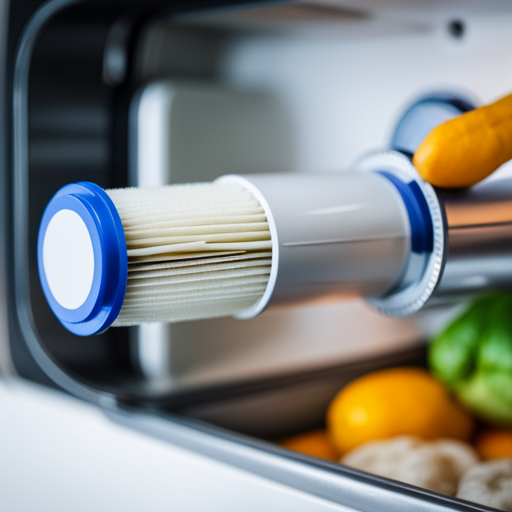Are you wondering if your refrigerator should have a water filter? Have you ever questioned the benefits of using one or wondered how to properly maintain and replace it? Well, you’re not alone. Many people are unsure about the truth about refrigerator water filters.
In this article, we will explore the world of refrigerator water filters and answer all your burning questions. You’ll learn why some refrigerators don’t come equipped with filters, the benefits of using a water filter for both water quality and health, and how to properly maintain and replace them.
So, sit back, relax, and get ready to learn the truth about refrigerator water filters.
Key Takeaways
– Using a filter can improve water quality and overall health
– Regular maintenance and replacement is crucial
– Cost comparison to bottled water or health risks of unfiltered tap water should be considered
– Some filters remove lead
Why Some Fridges Don’t Have Filters
You may be wondering why some fridges don’t have filters, but not all refrigerators come equipped with a water filter. This is especially true for budget refrigerators, which may have ice makers but no water filters. These types of fridges are designed to provide basic functionality at a lower cost, and having a water filter would drive up the price.
Additionally, some fridges without filters rely on automatic ice making. These fridges have a direct water supply that bypasses the need for a filter. The ice-making process itself acts as a filtration system, as any impurities in the water are frozen and left behind. While this method may not remove all contaminants, it is still effective at producing clean ice.
Water Quality and Health
Improving the quality of your drinking water can have a positive impact on your overall health. When it comes to your refrigerator water filter, it’s important to understand the role it plays in keeping your water clean and safe to drink.
Here are a few things to keep in mind:
1. The importance of hydration can’t be overstated. Drinking enough water is essential for maintaining proper bodily function, keeping your skin clear, and even aiding in weight loss.
2. Contamination in tap water is a real concern. Even if your city or town’s water supply meets federal standards, there may still be harmful bacteria, chemicals, or other pollutants lurking in your tap water.
3. A refrigerator water filter can help remove impurities and improve the taste of your drinking water. Many filters are designed to remove chlorine, sediment, and other particles that can negatively affect the flavor and quality of your water.
By using a water filter in your refrigerator, you can ensure that the water you’re drinking is of the highest quality possible. So, stay hydrated and stay healthy by making sure your fridge is equipped with a reliable and effective water filter.
Filter Maintenance and Replacement
Maintaining and replacing your filter regularly is crucial for ensuring the cleanliness and quality of your drinking supply. Most refrigerator water filters have a lifespan of six months, but this can vary depending on the usage and water quality in your area.
It’s recommended to check your filter’s condition every month, especially if you notice a change in the taste or odor of your water. While the cost of replacing your filter every six months may seem like an added expense, it’s important to consider the cost comparison of purchasing bottled water or dealing with the potential health risks of drinking unfiltered tap water.
Additionally, some filters can remove lead, which is a serious health concern in areas with lead pipes. It’s important to follow the manufacturer’s instructions for replacing your filter and not bypass it, as this can lead to contamination and potentially damage your refrigerator.
By regularly maintaining and replacing your filter, you can ensure that your drinking water is clean and safe for consumption.
Conclusion
So, there you have it – the truth about refrigerator water filters! Whether your fridge comes with a built-in filter or not, it’s important to consider the benefits of using one.
Not only does a water filter improve the taste and quality of your drinking water and ice, but it can also protect your health by removing harmful contaminants.
To ensure that your water filter continues to work effectively, it’s essential to properly maintain and replace it on a regular basis.
By following the manufacturer’s guidelines and paying attention to any signs of wear and tear, you can ensure that your filter is doing its job and keeping you and your family safe and healthy.
So, next time you’re in the market for a new refrigerator or need to replace your current filter, keep in mind the importance of having clean and fresh-tasting water at your fingertips.
